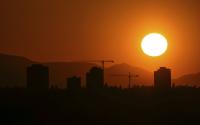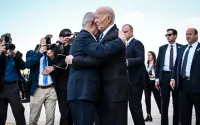Every war needs its writers. But as long as they are excluded from the battle zone the Afghan conflict will never capture the popular imagination - and we will never know the truthThe Observer, Sunday October 28, 2001 The war in Afghanistan is a puzzle. Barely three weeks old, it has inspired a mass of images, soundbites and commentary. Despite this intense scrutiny, it remains remote and mysterious, as enigmatic to the West as the country in which it is being fought.
Objectively, the Afghan war is terrifying. Not only has America deployed state-of-the-art military hardware from Tomahawks to Stealth bombers, its response to 11 September has roused the spectre of biological warfare. More generally, the assault on Osama bin Laden and the Taliban threatens a showdown between the worldwide forces of Islam and the equally determined forces of American consumerism.
Despite, or perhaps because of, this awesome threat, and the wall-to-wall media coverage it has sponsored, the war itself seems not yet to have captured the popular imagination. Subjectively, it is strangely uninvolving. There are many possible explanations. Confusion is one. Perhaps our uncertainty about our military deployment has something to do with the fact that, when you examine it from a literary perspective, the Afghan war has virtually no points of comparison with the historic wars of a uniquely bellicose and bloody twentieth century, notably the First and Second World Wars, Korea and Vietnam. This is not as abstract or as pointless as it might sound. Literature is always a reliable guide.
Each of those wars, whose legends are imprinted on our consciousness, threw up a memorable and influential literature, from Graves and Owen to Mailer and Herr. As the children of a century of war, our imaginations have been shaped by a voluminous, slightly dog-eared library which has profoundly affected our approach to any understanding of international conflict. Say what you like about those war stories, and many of them are probably best forgotten as expressions of sentiments many intelligent readers are now ashamed of, they none the less add up to a formidable inherited grammar of international conflict.
So perhaps part of the trouble with the current war is that when one consults the anatomy of war we grew up with, expressed in the classic journalism of reporters like George Orwell and William Shirer, in countless war poems, war novels, war memoirs and war films from Goodbye to All That to Apocalypse Now , one finds almost no connection with what's happening in Afghanistan.
First of all, there's been no foreboding, no eerie premonition. There were, no doubt, experts in Muslim affairs who warned of the menace of the al-Qaeda organisation, but they went unheard. By contrast, the wars of the last century were characteristically preceded by as much as a decade of steadily escalating nervous tension. Throughout the 1900s (and 1930s), writers and intellectuals all over Europe shared a sense that war would come.
Popular fiction, reflecting a pervasive nationalism, articulated popular fantasies of future war. Thrillers like Erskine Childers's The Riddle of the Sands traded on widespread English fears of invasion and sponsored a genre of 'invasion scare' fiction. At a more elevated level, Childers's fellow Irishman, W.B. Yeats, typical of his generation, dreamt of violence in a way that was echoed widely among the poets of continental Europe.
In Germany, among the poets affected by a half-heard drumbeat of imminent catastrophe, Alfred Lichtenstein, who was to die on the Western Front in 1914, wrote 'Prophecy' in 1913:
Soon there'll come - the signs are fair - A death storm from the distant north. Stink of corpses everywhere, Mass assassins marching forth.
The war we're fighting now had no such harbingers. It came, seemingly, out of nowhere. While it's probably true to say that one had only to study Osama bin Laden's vengeful rhetorical programme to realise that a day of reckoning was due, the hard fact is that the CIA, the Foreign Office, the FBI, the Pentagon and the secret intelligence agencies within MI5 and MI6 had no inkling of 11 September. Unlike Sarajevo, unlike the invasion of Poland, it came, literally, out of a clear blue sky.
In the aftermath of the World Trade Centre atrocity, and before the bomb ing and shooting began, this war did have at least one thing in common with the onset of twentieth-century wars - hysteria. Bush and Blair share this with Asquith and Woodrow Wilson, Neville Chamberlain and FDR. They were propelled into action by a tide of outraged public opinion that insisted on a mobilisation of the Anglo-American war machine.
America, certainly, has been touched by a defiant, patriotic fervour similar to the war fever that swept Europe in August 1914. But here, too, there are important differences, and they help to explain why this war is quite unlike its twentieth-century precursors.
The young men who so eagerly enlisted in the summer of 1914 were supremely patriotic in a way that their Stars and Stripes-waving great-grandchildren are not. They were joining up to be heroes and to risk death in the service of their country. Their patriotism was wholehearted, even naive. The patriotism of 1914 was glorious, honourable and uplifting. Rupert Brooke, who has come to represent, unfairly, the voice of traditional jingoism, wrote, famously, of 'swimmers into cleanness leaping', of young men purging the corruption of the Edwardian age in the 'release' of belligerent action.
It would be interesting to know what the men of the 82nd Airborne think about their deployment from the flight deck of the USS Kitty Hawk, but it's a fair bet they are not turning 'glad from a world grown old and cold and weary'. More accurately, they are the military expression of the Western world's sense of outrage at the horror of 11 September.
Ther were many components to that outrage - horror, shock, fear, grief. The decision to go to war has not yet unleashed a frenzy of killing. Rather, it was preceded by an unimaginable slaughter. In this topsy-turvy scenario, grief has ushered in warfare, not been sponsored by it.
In the twentieth-century wars we remember on Armistice Day, grief (and an accompanying guilt) is the terrible, unappeasable legacy the survivors have to work through. In Testament of Youth, a typical interwar memoir, Vera Brittain explores the life of a young woman blighted by the deaths of both her brother and her fiancé. The widows and orphans from the World Trade Centre will identify with Brittain's account of that bereavement: 'I began to cry Edward! Oh Edward!' in dazed repetition, as though my 'persistent crying and calling would somehow bring him back'.
But the essential contrast between then and now is that the agony of loss occurred as a consequence of war, and was not a cause of it. Which brings us to another crucial difference. From the day the first troopships steamed across the Channel in 1914 to the moment the last US marine scrambled aboard the hovering Huey on the US embassy rooftop in Saigon 1975, the wars that shaped our imaginations involved a colossal and tangible mobilisation.
Not for a minute do I underestimate the astounding feat of organisation involved in getting the Anglo-American task force into position around the borders of Afghanistan, but for the average man or woman living in London or New York, Birmingham or Pittsburgh, the current mobilisation has involved almost none of the social dislocation we traditionally associate with warfare. By the standards of warfare in living memory, this is, mercifully, still a phoney war.
Nor are we seriously exposed to what the military historian John Ellis has called 'the sharp end of war'. To the Vietnam War photographer Tim Page: 'This war is closer than any conflict we've ever seen to a virtual reality computer game. It's very abstract, even more than Kosovo.' Technologically, its remoteness comes easily. In 2001, it is possible to be a spectator at a daring night raid on a Taliban bunker outside Kandahar without stirring from our armchairs. Like the Gulf War, but unlike the other twentieth-century wars, this is a living-room war and our experience of the front line has become a new kind of voyeurism.
Another celebrated war photographer, Don McCullin, who spent time in Afghanistan during the Soviet occupation, and who says that 'the Americans have got themselves into a terrible mess', also believes that this is partly due to new limitations of public tolerance: 'War has become tailored to suit public taste,' he says. 'Especially in America, we want our wars to be public relations successes... but the truth is that it's impossible to have a war without civilian casualties.'
We have watched every moment of this crisis, from its horrific beginnings to its quotidian military development, on television. And the writers who have responded to it in print, the Austers and the McEwans, have been articulating thoughts inspired by television images.
It's a far cry from Stephen Crane (The Red Badge of Courage) or John Reed (Ten Days That Shook the World). Here is Crane describing the aftermath of a battle in the Spanish-American War of 1898: 'Pushing through the throng in the plaza, we came in sight of the door of the church, and here was a strange scene. The church had been turned into a hospital for Spanish wounded who had fallen into American hands.'
Traditionally, there were two kinds of report from the front line: the testimony of soldiers in letters home, in poetry and in memoir (the Sassoon response) and the reportage of journalists (the pioneering William Russell of The Times) sent to cover the conflict. A hundred years ago, the ratio of Sassoons to Russells was at least 10 to one.
The experience of the Suffolk farm-boy Leonard Thompson, who found himself at Gallipoli in June 1915, is typical. He writes: 'We arrived at the Dardanelles and saw the guns flashing and heard the rifle fire... later that day, we marched through open country and came within a mile-and-a-half of the front line. It was incredible. We were there - at the war! The place we had reached was called "dead ground" because it was where the enemy couldn't see you. We lay in little square holes, myself next to James Spears from the village.'
In the present war, that Sassoon-Russell ratio is reversed. Military news management ensures that we have virtually no knowledge of what the troops are actually experiencing. At the same time, in page after page of newsprint and roll after roll of videotape, there is a seemingly endless supply of commentary. W.F. Deedes, who first went to war in 1935 when he covered the Italian-Abyssinian War, believes that it's precisely the novelty and uncertainty of the war that's encouraging speculation and commentary, rather than reportage.
'In a war of conflict like the First or Second World Wars, it's much harder to speculate because the facts are clearly established. This is a war without landmarks, it's much more amorphous.' Would he call it a war in the accepted sense of the word? Deedes hesitates. 'N-n-n-no. I don't think I would. Whatever else it is, it's certainly the vaguest war we've ever been involved in.'
From a journalistic point of view, this vagueness is punctuated less by reporting than by long-range photographs. In the present crisis, the significant military event that has been on all the front pages is the pre-dawn parachute drop of the US Rangers on a Taliban stronghold near Kandahar, an operation that was narrated in a series of arresting photographs. With a few exceptions, notably Robert Fisk in the Independent and some of the reportage in the New Yorker, the hi-tech character of this war, combined with the iron control of the military authorities, has reduced much print journalism to the level of caption writing.
It was not always like this. In 1854, W.H. Russell began his report on the Battle of Balaclava and 'the Charge of the Light Brigade' with the words: 'I shall proceed to describe what occurred under my own eyes, and to state the facts which I have had from men whose veracity is unimpeachable.'
Russell's heirs are not so fortunate. They get little or no access to the troops; they must rely on briefings and are vulnerable to military 'spin'. William Shawcross, the author of Sideshow, an exposé of America's secret bombing of Cambodia, recalls what he calls the 'glory days' of late-twentieth-century war journalism. 'It was incredible. The US military gave you this MACV card [which I still have]. This card, which assigned the war correspondent the rank of major, guaranteed you a seat on any US military aircraft, going anywhere. So, in Vietnam, you could be right inside the war zone. It was Liberty Hall. Nowadays, I think reporting is much harder. Now you couldn't do the things we used to do. They [the military] learnt their lesson, of course.'
Tim Page, who also saw twentieth-century war at first-hand in Vietnam, complains that 'you can't verify anything. We don't know what the hell is going on in there'. Reporters today are rarely, if ever, granted the kind of exposure to combat that enabled Russell to report how 'soon after eight Lord Raglan and his staff turned out and cantered towards the rear of our position'. Later in the same report, it was Russell, the journalistic eyewitness, who so brilliantly described the flashing sabres of the Light Brigade as 'like the turn of a shoal of mackerel'.
McCullin is even sceptical about many reporters' actual exposure to the conflict. 'There are people claiming to be at the front but I get the impression that they were bused there in groups and don't have much freedom... everyone is being manipulated and controlled.' Page agrees. 'We're getting as good a picture as we're intended to have. It's all stage-managed.'
McCullin adds that the further problem of this 'armchair war' is that the absence of firsthand experience extends to the planners. 'When the troops actually get down there on the ground, I can tell you from experience that their biggest problem is going to be the millions of anti-personnel mines.' This, of course, is the deadly legacy of the Russian occupation of the 1980s, another slightly distorted point of contact with the wars of the past.
In the Crimea, the Russians were the enemy. In the Great War, the Russians began as dynastic allies and ended as Bolshevik pariahs. In the Second World War, Stalin became an uneasy (and opportunistic) ally who eventually ushered in an era of Cold War. Vietnam was, at least in part, inspired by the misguided belief that the 'domino effect' of south-east Asian 'communism' had to be stopped in Indochina.
In the anatomy of war we have inherited from the twentieth century, the declaration and prosecution of international war seems always to involve facing up to Russia, and perhaps China, and to involve acute geo-political risk, notably a nuclear exchange. In 2001, post-Soviet Russia is a passive member of Bush's Grand Alliance and the risk of bombing Kabul and Jalalabad does not include the threat of reprisals from Moscow or Beijing. At this moment, indeed, the chief reprisal seems to be the still-unsourced threat of anthrax poisoning.
It gets stranger still. We have been told that 'Muslim fundamentalism' is the enemy, yet President Bush, after his fumbling and inept invocation of 'crusade', has subsequently been at pains to stress that America has no quarrel with the Muslim world at large.
Contrast this with the morale-boosting anti-Nazi rhetoric of Winston Churchill in June 1940: 'We must defend our island, whatever the cost may be, we shall fight on the beaches, we shall fight on the landing grounds, we shall fight in the fields and in the streets, we shall fight in the hills; we shall never surrender.'
Part of Churchill's blood-tingling certainty derived from his bizarre but instinctive sense of destiny. More important, and quite different from the Bush-Blair position of October 2001, the sureness of his rhetoric derived from the breathtaking simplicity and clarity of his war aims.
Where the Allied powers of the Second World War were committed to eliminating the evils of Nazism, starting with Adolf Hitler and ultimately extending to the rackety apparatus of the Nazi state, the Allied powers of 2001 are loosely united against an ill-defined 'terror network' and are unable, really, to answer convincingly some quite simple questions: who, exactly, are we fighting? How, and where, will we engage them in combat? How will we know when we have won?
What's more, allied spokesmen are terrified, rhetorically speaking, of alienating moderate (ie pro-Western) sections of Muslim society. As the veteran BBC reporter Charles Wheeler has pointed out: 'Official statements about the war and its aftermath throw up more questions than answers. Are the Taliban now the main enemy? What of bin Laden? Does Washington know that he is still in Afghanistan? Or is that no more than a working assumption?' In Afghanistan, we seem to have exchanged the fog of war for the fog of communiqué.
W.F. Deedes, who says he accepts the Bush-Blair line that the West is up against a uniquely malevolent enemy intent on destruction, notes: 'Nobody has developed a war aim. This is paradoxical because this is the first war [in his experience] in which there is absolutely no room for negotiation. No accommodation is on offer. There are simply no terms on which this conflict could be settled.'
Where previous wars have been characterised by tub-thumping rhetorical flourishes, the war against Afghanistan has been prosecuted with the softly spoken soundbites and fuzzy answers appropriate to television.
Television, the medium by which we have acquired our knowledge of the war, and the medium that first brought us the dreadful news of 11 September is, famously, a 'cool' medium. Perhaps it will only be when the experience of the war finds its way on to the pages of books and before that into newspaper and magazine pieces based on a real experience of what Deedes calls the 'formidable terrain' of Afghanistan that it will begin to grip our imagination and become intelligible.
Not until the confusion begins to be organised into words and we begin to draw a literary map of this experience will this peculiar war start to make sense.
What the reporters say
Maggie O'Kane, The Guardian The other day, 5,000 metres up the Hindu Kush mountains, after six days of climbing from Pakistan into Afghanistan, the last 24 hours non-stop, I sat down on a rock and cried hard bloody tears. There must be easier ways to cover a war than this.
But the reality is that except for desperate measures like Yvonne Ridley's [the Express reporter held captive after being smuggled in wearing a burqa] we are simply not covering what appears to be the most reported war in world history. The catchline: 'so and so reporting from northern Afghanistan' is somewhat misleading as we stand on mountain tops and watch for puffs of smoke. Remember the market place bombing in Sarajevo that finally moved Clinton's hand on peace in Bosnia? The world powers involved in this war have decided that those kind of horrors offer, as Asquith said to the former Guardian editor C.P. Snow about the First World War, 'too much reality'.
There is, is there not, something terribly uncivilised about what a Tomahawk missile does to human beings when it blows their bodies apart. And this after all is the battle of 'civilised nations' against international terrorism. Isn't it?
Robert Fisk, The IndependentWhen you don't have access to the real facts in a situation you have to rely on sources such as al-Jazeera TV and Pentagon generals - and you can't cross-question these people. This means there is a tendency for journalists, when they are not allowed to report on a situation 'on the ground', to become mouthpieces for authority.
The war has to be covered and we have a duty to to cover it but this is probably the most undercovered war I've come across in my life as a journalist. It's not the fault of the reporters who are not being allowed in Afghanistan. But it means the Taliban can claim 100 dead civilians under US bombing and the Americans can deny it, and we are not there to check. I'm really not certain how one gets round this situation. Increasingly, since Vietnam, wars involving major powers have become more and more difficult to cover.
The real tragedy is that we are unable to give first-hand accounts of the suffering of Afghan civilians inside the country who are being killed and wounded by the bombing and who are fleeing in a state of starvation. These people are just as innocent as those who died in the crimes against humanity in New York and Washington. But our inability to get inside the Taliban-controlled areas means that they are not real to us, they are vague statistics that the Taliban can manipulate and the Americans can deny.
Jason Burke, The Observer What has become absolutely clear to me is that the US is prepared to go as far as it can without lying to obfuscate what is really going on. Again and again we've had a situation in which there have been reports of civilian casualties and the US has called the Taliban liars and then had to admit that the original claims by the Taliban were accurate. I've got to the point where I'd be more inclined to believe what the Taliban is saying than what the American authorities are telling us.
There is also absolutely nobody from either the UK or the US on the ground in Pakistan telling us what's happening - everything comes from the Pentagon or Whitehall. Anything we find out on the ground comes from the direct accounts of refugees and the two stories differ to the extent that Clare Short can claim - astonishingly - that the refugees her representatives have spoken to don't report any casualties whereas those we speak to report casualties on a considerable scale.
Christina Lamb, The Sunday Telegraph This war is different from any other I've covered in that they've banned all foreigners from Taliban-held Afghanistan and those who have tried to get in have been caught. They've threatened to hang anyone using a satellite telephone. Usually there are some rules with regard to respecting journalists but that isn't the case here. You're relying on speaking to people coming in and out of the area and most of the people are anti-Taliban, so you're getting a slanted view.
We can't know what they are actually doing on the ground as there is no independent verification of what they've done and Afghans love to tell stories. When I covered the conflict there with the Russians in the Eighties, they'd claim to have shot down a helicopter only the day before but of course when you asked where the wreckage was it had just been cleared away. It's a similar situation with the Pentagon's 'before and after' photos - there was nothing in Afghanistan to start with. Even the airports were incredibly primitive. So you are always left wondering quite what they are doing.
Interviews by Molloy Woodcraft.






